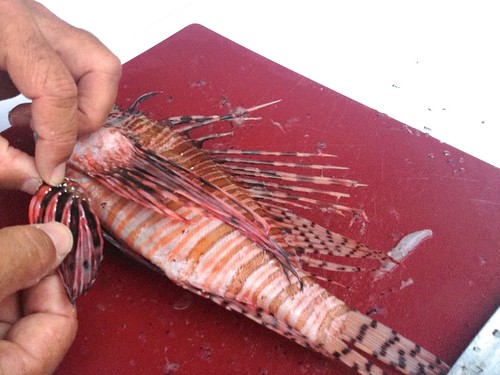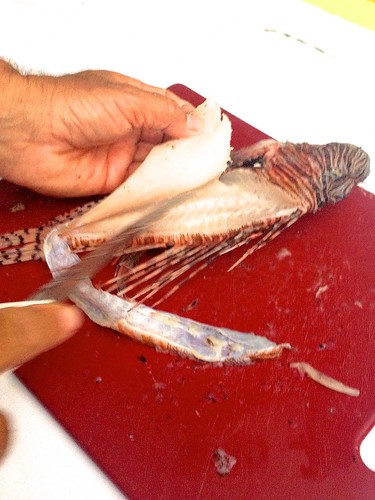 |
| This beautiful fish is wreaking havoc in our native Florida waters and beyond. Photo courtesy of REEF. |
Last month, I attended the First Annual Lionfish Food and Wine Night at Key Largo’s Fish House Encore, hosted by REEF, a grassroots organization devoted to marine conservation. The house was packed at this exclusive gourmet event, where locals and tourists alike were eager to learn about lionfish.
Lionfish are gorgeous, dramatic-looking finny creatures, with elongated spines that jut out from their frames in mottled shades of red, orange, white and black. In water, the spines sway gently in a beguiling dance. Indigenous to the Indo-Pacific, lionfish are prized on this side of the globe as an exotic aquarium species.
It’s nothing personal, but unfortunately, they don’t belong in our coastal waters.
 |
| Lad Adkins of REEF lecturing on the marine issues involving lionfish. |
Two visually identical species of lionfish were first introduced into the Atlantic via the aquarium trade in the 1980s. The result? Non-native lionfish have invaded waters from the Carolinas to South America, the Caribbean and Gulf of Mexico.
And as one report indicates, they may even be able to handle estuarine environments with lower salinity, including the Loxahatchee River.
Voracious eaters, lionfish also spawn prodigiously, reaching sexual maturity in less than a year, while they feast on over 70 species of fish and many invertebrate species, altering the balance of long-established ecosystems. Lionfish densities can reach as much as 200 adults per acre and a female in the Caribbean can spawn over 2 million eggs per year.
This pretty fish is like the Terminator!
Lionfish have evolved a very clever defense system through their venomous spines, which protect their bodies with a neurotoxin, so they must be handled carefully to avoid stings on human flesh.
 |
| The venomous proteins in the spines can be denatured with hot water. Just be careful. |
God forbid, but if a lionfish up a Florida river ever seriously hurt a human, we might even get Jeremy Wade of River Monsters to come down here and investigate!
It’s too bad this invasive species isn’t easily harvested by conventional fishing methods such as rod and reel, what with so many other fish in the reefs competing for bait. Maybe they’re just too wily. Also, they can thrive in depths as far as 1000 feet.
They tend to hunker down under structure and like stalking for live bait.
Spearfishing seems to be the best method of capturing lionfish and the Florida Fish and Wildlife Commission has encouraged open season on the possession and harvest of the species. Numerous lionfish derbies for recreational fishermen take place around Florida and other invaded aquatic regions.
A LIONFISH WEEKEND WARRIOR
Deborah Meltzer, owner of a printing business in the Fort Lauderdale area for the last twenty years, is a scuba diver and lady angler who takes her lionfish harvesting seriously. Sex and the Beach spoke on the phone with her about her underwater fishing endeavors offshore ranging from Pompano Beach to Fort Lauderdale accessible reefs.
“I’m more into the catching of them than cooking them,” she said. “I started out getting interested in hunting lobsters and then I took a course in lionfish. It’s not lobster season right now, so I like to go for lionfish since there’s no restriction.”
She admitted that divers can only keep them in check and that they’d never be able to get to them all to curb the population. “That’s how bad the problem is,” she said. “But I do my little part in helping save our reefs from invasive species.”
Because of their dorsal and anal venomous spines, they have no natural predators in this part of the world.
“Bigger fish would have to learn how to eat them,” said Meltzer.
“I’ve heard it’s like a bee sting on steroids,” she said. “Although, I’ve never been stung.”
In addition to a traditional spear, Meltzer sometimes uses nets or a PVC contraption that relies on a trap door to safely carry multiple lionfish underwater, thereby preventing stings.
“It's really important to learn how to handle them” she explained. “So this way you don't feel their powerful venom.”
Once the fish are on board and ready for a first mate’s fillet knife, it’s a different story.
“We fillet the larger ones and check their stomach content,” she said. “They eat everything that’s economically important to us and environmentally important to the reef.”
OUT OF THE WATER AND IN THE KITCHEN
 |
| Fillet carefully and you've got a tasty dinner. |
But back to the Key Largo event.
The best part for fishermen is that once you’ve safely caught and filleted a lionfish, you’ve got a potentially tasty dinner if your culinary skills are up to par. The white flesh is tender, akin to hogfish, without that “fishy” scent and flavor we associate with species like tuna.
The fish fillet lends itself beautifully to a traditional wine, butter, shallots and cream sauce preparation with a lightly floured, egg-washed fillet.
 |
| Straight out of Escoffier. A traditional preparation. Julia Child would approve ... I think. |
My favorite dish at the Fish House Encore was the Sea Salted Cured Lionfish served with heirloom tomatoes, red-onions, cilantro and drizzled with olive oil.
The second course was also delicious. The lionfish was encrusted with fried red onions and Japanese breadcrumbs, baked in the oven and served with a sweet and sour sauce over arugula salad.
I wasn’t too happy with the other two courses and besides, I was rather full by then. I’d avoid mixing bacon with the lionfish or anything too strong in scent, smoky or chewy in texture. Think white wines and light flavors or textures, flash preparations with minimal time in the pan to preserve the tenderness of the flesh.
Next time you go to eat fish at a Florida restaurant, ask if they serve lionfish. Or better yet, ask your local fishmonger if they’ve got any on ice. A bounty of recipes, which you can apply to similar fish like snapper or grouper, is available in the The Lionfish Cookbook, authored by Tricia Ferguson and Lad Adkins. Beautifully photographed, the book is a must for any home chef interest in reading simple yet varied preparations for fish. Proceeds from book sales will continue to support marine conservation and lionfish research.
RESOURCES
Reef.org
Florida Fish and Wildlife Commission
Lionfish Derbies
Lionfish Cookbook
Restaurants Serving Lionfish (to date)
Loxahatchee River Study
National Geographic post on sharks being taught to eat lionfish in Roatan, Belize
Follow @killthelionfish on Twitter for latest news on lionfish events and issues.

1 comment:
This sounds like a great event, raising awareness and turning a pest into a gourmet meal all at the same time.
Post a Comment